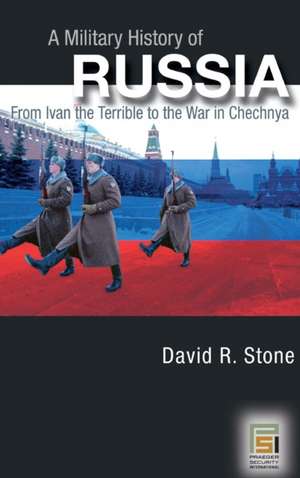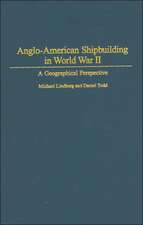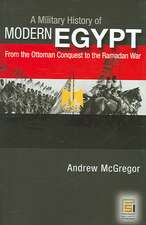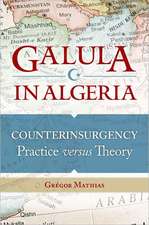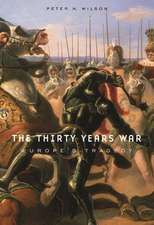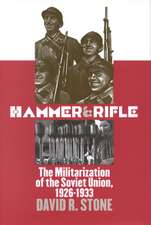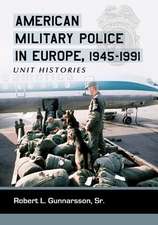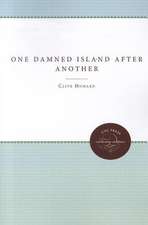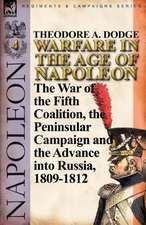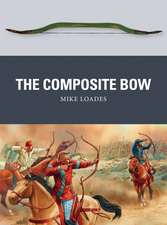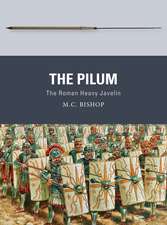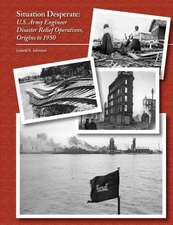A Military History of Russia: From Ivan the Terrible to the War in Chechnya
Autor David Stoneen Limba Engleză Hardback – 29 aug 2006 – vârsta până la 17 ani
Preț: 463.30 lei
Preț vechi: 609.86 lei
-24% Nou
Puncte Express: 695
Preț estimativ în valută:
88.68€ • 91.38$ • 74.86£
88.68€ • 91.38$ • 74.86£
Carte tipărită la comandă
Livrare economică 03-17 martie
Preluare comenzi: 021 569.72.76
Specificații
ISBN-13: 9780275985028
ISBN-10: 0275985024
Pagini: 280
Dimensiuni: 156 x 235 x 28 mm
Greutate: 0.59 kg
Editura: Bloomsbury Publishing
Colecția Praeger
Locul publicării:New York, United States
ISBN-10: 0275985024
Pagini: 280
Dimensiuni: 156 x 235 x 28 mm
Greutate: 0.59 kg
Editura: Bloomsbury Publishing
Colecția Praeger
Locul publicării:New York, United States
Notă biografică
David R. Stone is Associate Professor of Russian history at Kansas State University. His first book Hammer and Rifle: The Militarization of the Soviet Union, 1926-1933 , was a History Book Club selection, winner of the Historical Society's inaugural Best First Book prize, and co-winner of the Shulman Prize from the American Association for the Advancement of Slavic Studies. The author of numerous articles on Russian and Soviet military and diplomatic history, Stone is currently working on a study of Trotsky's role in the creation and development of the Red Army.
Cuprins
List of MapsAcknowledgmentsIntroduction1 The Rise of Muscovy2 The Time of Troubles3 The Early Romanovs4 Peter the Great5 After Peter6 Catherine the Great7 The Napoleonic Wars8 Repression and Defeat9 Reform and Recovery10 The Russo-Japanese War11 World War I12 The Soviet Experiment13 The Great Patriotic War14 The Soviet Superpower15 The Emergence of a New RussiaSuggested ReadingIndex
Recenzii
Stone provides a relatively brief but commendably well-balanced survey of Russian military history from the earliest years of the Kievan Rus state to the present. Whereas most studies of the Russian military concentrate on the events of the past two centuries, this book offers a cogent account of earlier years, including military innovations and wars during the time of Ivan the Terrible and the complicated military history of Peter the Great's reign. Moreover, the author succeeds admirably in his intention not only to include descriptions of the major battles, campaigns, and wars fought by the Russians, but also to discuss the interrelationship of military affairs with the development of the Russian state and society..The book can be read with great profit by anyone interested in Russian military history. Recommended. All levels/libraries.
Stone does an artful job of recounting over 500 years of Russian military campaigns and explaining the complex and reciprocal relationships between the military and society in Russia, as well as Russia's role in Western military history (e.g., the triumph against Napoleon), enacted at the expense of its economic and civic gains. He clarifies Russia's place in the ebb and flow of alliances among emerging nation states in Europe. Every Russian history written in the past 20 years contains much of the same information that Stone presents, but he has a notable ability to clarify military history and thereby Russian history generally..[h]is style will catch the eye of students and casual readers. Recommended for public, high school, and college libraries.
[A] first-rate, crystal-clear history of five centuries of Russian military operations, from which I have learned a great deal.
This textbook - the first to appear in forty years - should prove invaluable to students, while specialists, too, will learn a great deal.
Stone does an artful job of recounting over 500 years of Russian military campaigns and explaining the complex and reciprocal relationships between the military and society in Russia, as well as Russia's role in Western military history (e.g., the triumph against Napoleon), enacted at the expense of its economic and civic gains. He clarifies Russia's place in the ebb and flow of alliances among emerging nation states in Europe. Every Russian history written in the past 20 years contains much of the same information that Stone presents, but he has a notable ability to clarify military history and thereby Russian history generally..[h]is style will catch the eye of students and casual readers. Recommended for public, high school, and college libraries.
[A] first-rate, crystal-clear history of five centuries of Russian military operations, from which I have learned a great deal.
This textbook - the first to appear in forty years - should prove invaluable to students, while specialists, too, will learn a great deal.
